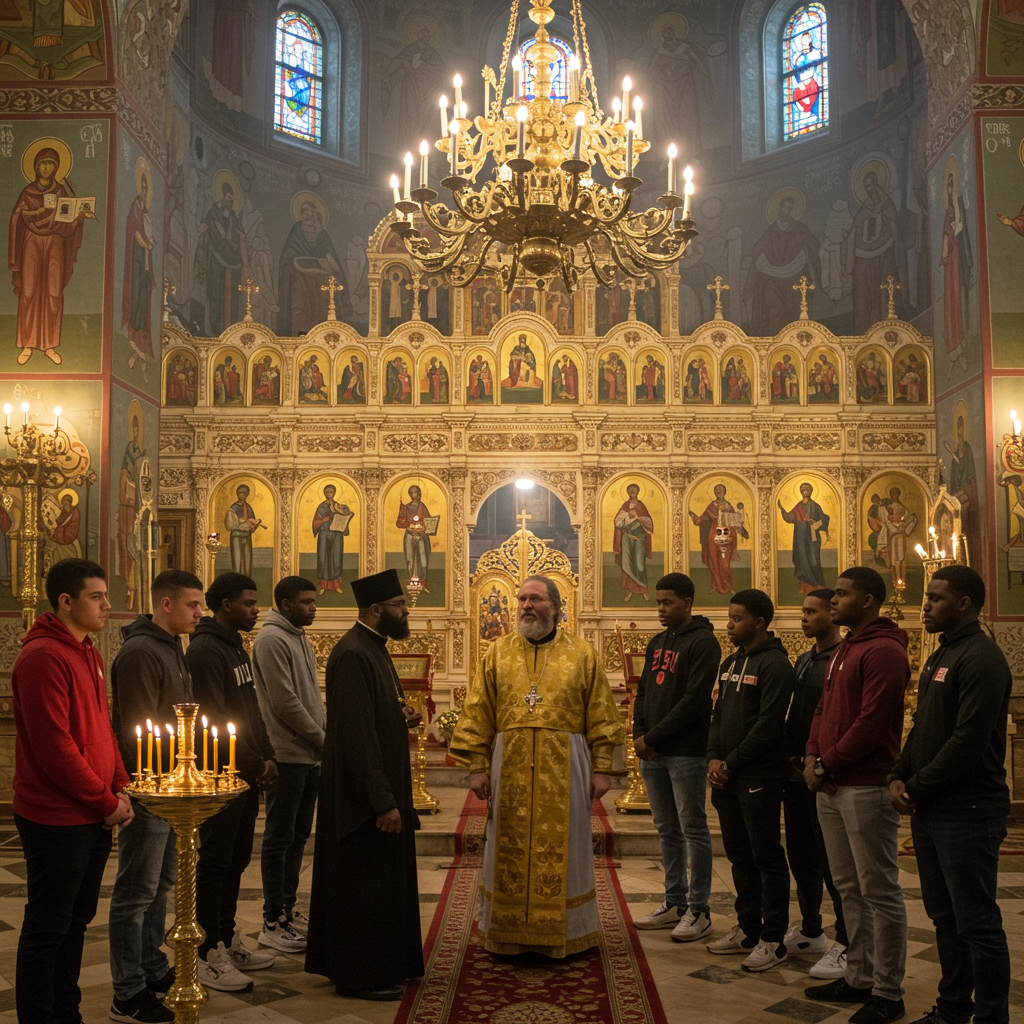A growing number of young American men are finding their way to the Russian Orthodox Church, drawn by a promise of traditional masculinity and a community they feel is missing in modern Western society. This trend, while representing a small segment of the US population, reflects deeper cultural and spiritual shifts.
One prominent figure in this movement is Father Moses McPherson, a priest in Georgetown, Texas, affiliated with the Russian Orthodox Church Outside Russia (ROCOR), an offshoot of the Moscow Patriarchate. Father Moses actively promotes a vision of strong, unapologetic masculinity, notably through his online presence, including YouTube videos where he discusses topics like how to achieve “absurd levels of manliness.”
His message is clear: he derides practices he deems overly feminine, listing examples like wearing skinny jeans, crossing one’s legs, using an iron, shaping eyebrows, and even eating soup. Videos show the powerfully-built father of five weightlifting, projecting a physical embodiment of the strength he preaches. A convert from Protestantism who once worked as a roofer, Father Moses has seen remarkable growth in his congregation. He notes that in the last 18 months, attendance has tripled, with 75 new followers preparing for baptism in the last six months alone. “When my wife and I converted 20 years ago,” he says, “we used to call Orthodoxy the best-kept secret… But in the past year-and-a-half our congregation has tripled in size.”
Why Young Men Are Converting to Orthodoxy
The appeal seems to stem from a perceived disconnect with contemporary American life. Many converts, including software engineer Theodore, feel society has been “very harsh” on men, constantly telling them they are wrong. Theodore, who felt an internal emptiness despite having a successful career and loving wife, complains that men are criticized for wanting to be the primary breadwinner and support a stay-at-home wife, labeling such traditional roles as “toxic.”
This sentiment is common among the new Orthodox converts. They often belong to what’s been termed the “anti-woke crowd,” seeking a faith and community that upholds values they feel are under attack in the wider culture. They find solace in the ancient traditions of Orthodoxy, which date back to the 4th century AD, offering a sense of stability and timelessness.
Traditional Family Values and Homeschooling
A significant practice among many converts is homeschooling their children. This decision is often linked to the belief that women should prioritize family over career and is seen as a way to ensure a religious education while protecting children from exposure to topics like “transgenderism” or discussions of multiple genders prevalent in public schools, as noted by Archpriest Father John Whiteford.
Family size is also a key teaching. Father Moses instructs married couples to avoid contraception and have as many children as possible, stating, “Show me one saint in the history of the Church who ever blessed any kind of birth control.” He also condemns masturbation as “pathetic and unmanly.”
The Data Behind the Trend
While Orthodox Christians make up only about one percent of the US population, there’s a clear demographic shift occurring. Data from the Pew Research Center indicates that Orthodox Christians in the US are now 64% male, a significant increase from 46% in 2007. This trend is supported by a smaller study of 773 converts by the Orthodox Church in America (OCA), another major Orthodox jurisdiction in the US, which found that most recent newcomers are men, many of whom cite the Covid-19 pandemic as a factor in seeking a new faith.
Professor Scott Kenworthy, an expert in Eastern Orthodox Christianity, confirms this broader phenomenon. His OCA parish in Cincinnati, like Father Moses’s church in Texas, has seen a constant flow of new inquirers and catechumens since the Covid lockdown, growing significantly after remaining steady for years.
The Digital Sphere and Cultural Connections
The digital space is crucial to spreading this message. Father Moses has a large online following, but he’s just one voice among dozens of Orthodox clergy and male followers producing podcasts and videos that attract converts. This online presence helps connect individuals seeking traditional values with Orthodox communities.
For some, the appeal extends to a perceived alignment with Russia, viewed by some as the “last bastion of true Christianity.” This is influenced by imagery of Russian President Vladimir Putin participating in religious services and promoting conservative social policies. Converts like Buck Johnson, a firefighter and podcast host, express concern about negative American views on Russia, attributing them to Cold War holdovers and questioning mainstream media narratives. Even the controversial stance of Patriarch Kirill, the head of the Russian Church, who has supported the invasion of Ukraine, is sometimes defended by American converts who believe his words have been distorted.
Elissa Bjeletich Davis, a Greek Orthodox convert, notes that some converts, particularly in the Russian Church, sometimes hold what she sees as rigid, “military, rigid, disciplinary, masculine, authoritarian” views of their new faith, drawing comparisons to early American Puritans.
The desire for a place upholding traditional values has even led some conservatives to consider relocating to Russia, as exemplified by Father Joseph Gleason, a former Texas priest who moved his family to Russia, citing its stance against same-sex marriage and support for homeschooling.
Ultimately, many young men converting to the Russian Orthodox Church in the US are turning away from what they perceive as instant gratification and American consumerism. They are seeking long-term values: tradition, love for family and community, and a deeply rooted faith that offers a clear structure and purpose, finding that Orthodoxy resonates strongly with these desires, particularly in conservative strongholds like Texas.
References
- https://www.bbc.com/news/articles/c30q5l8d4lro
- https://www.yahoo.com/news/young-us-men-joining-russian-230519070.html



